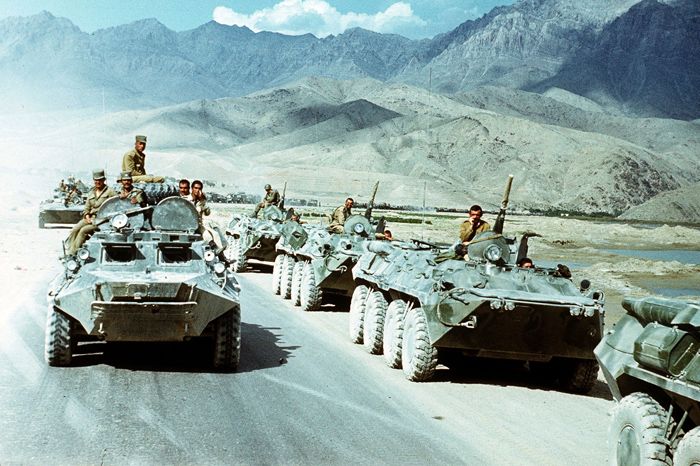 Source: Wikipedia
Source: Wikipedia
While NATO is preparing to withdraw its troops from Afghanistan in 2014, Russian pundits and international observers try to account for the Organization’s recent attempts to take a closer look at the Soviet experience. Some experts believe that it may prevent NATO from making fatal diplomatic and military mistakes, yet others argue that it will be very challenging to establish fruitful collaboration between Russia and NATO.
In mid-April, NATO officials sent an unofficial request to Russia’s Defense Ministry, asking to share documents and analysis on the 1989 Soviet withdrawal from Afghanistan, according to reports from the respected Russian media outlet Kommersant.
This NATO stance may indicate that misgivings about the tensions in Central Asia have been increasing in the West and have led it to seek Russia’s involvement.
“NATO would be eager to get whatever help and advice it can for the withdrawal from Afghanistan from Russia, whose experience of doing exactly that is still recent memory,” says American journalist Gregory Feifer, author of the book “Great Gamble,” which deals with the Soviet experience in Afghanistan.
“[After all], the Soviet withdrawal was one of the most successful aspects – if not the most successful – of the war in Afghanistan,” Feifer says. “NATO can directly apply lessons learned from the experience, especially the practice of negotiating with rebels to allow passage of forces from the country.”
At the same time, Feifer believes that Russia's cooperation with NATO should “further the general aim of trying to engage Moscow, not least for the sake of helping provide security in a region that directly affects Russian security.”
Alexei Malashenko, an expert from Moscow Carnegie Center, argues that the Russian experience in
Afghanistan could be useful for NATO from a diplomatic angle.
In his opinion, the West needs to keep in mind that it is very dangerous and shortsighted to abandon its Afghan allies, who could be helpful in tackling the problem from the inside – as was the case with Mohammad Najibullah, Afghan president from 1987 to 1992.
Taliban militants killed Najibullah at the Kabul-based U.N. headquarters in 1996, after Russia failed to give him political refuge: Following its traumatic experience in Afghanistan and its withdrawal from the country, Moscow seemed to be reluctant to interfere in Kabul’s local conflicts and deserted its allies.
“By no means should one abandon its allies like Russia deserted Najibullah,” Malashenko says in warning.
Evgeny Minchenko, head of the International Institute for Political Expertise, echoes this view. The NATO withdrawal from Afghanistan might shake the position of its current president, Hamid Karzai, and he might fall prey to Taliban militants like Najibullah, according to the expert.
“The NATO withdrawal will bring more instability in the Central Asia region and increase pressure and [influence] of radical Islamists,” says Minchenko. “The current Afghan president might repeat Najibullah’s fate.”
In his opinion, this would mean growing escalation in the region and its further destabilization, which may hurt Russia’s security interests.
After all, Russia “views Afghanistan today largely through prism of security threats to itself and its Central Asian neighborhood,” reads the “Afghanistan: A view from Moscow” information bulletin, which was prepared by the Moscow Carnegie Center in 2010.
The Soviet Union’s “Afghan syndrome” and the post-Soviet Russian experience in the North Caucasus fuel Russia’s fears. Moscow keeps in mind the worst Afghan scenario, which may bring more instability if the Karzai government falls and NATO troops withdraw precipitously.
“The scenario carries a sense of déjà vu: The Taliban had come to power in Afghanistan, which encouraged Central Asian Islamists and offered training camps to Chechen rebels,” the Carnegie bulletin reads. “Russia fears a rise in Islamist radicalism across the region. …
Some Russians espouse a kind of domino theory and expect the ‘disaster area’ to spread all the way to Russia’s own borders.”
According to Malashenko, Afghans perceive the U.S. withdrawal in same manner as they did the Soviet one – as “defeat” of the enemy.
“[That’s why] they may orchestrate another ‘big fireworks’ afterwards,” says Malashenko. “Actually, Taliban militants don’t need the U.S. withdrawal. They need the ‘banishment of occupants.’”
Although the U.S. has no borders with the Central Asia, its withdrawal could resonate elsewhere and may be accompanied by a spike in military tensions, according to Malashenko.
“The Afghanistan issue isn’t limited to the withdrawal of troops,” he says. “It’s uncertain what will happen there afterwards. But it is hardly likely to be a happy-end scenario."
The echo of Boston
Given recent events – such as the Boston bombings and growing escalation in the Central Asia region – Russia and NATO should focus more on withstanding international terrorism and bringing more stability in the region.
In Feifer’s opinion, cooperation with Russia has always been in NATO’s interests, and the Boston Marathon bombing might have increased the pressure to involve Russia in tackling the Afghan standoff.
By contrast, Minchenko argues that the Boston attack had no impact on NATO-Russia collaboration in tackling the Afghan crisis and international terrorism.
“Unfortunately, despite the Boston bombing, NATO and Russia didn’t come to an idea that they should closely collaborate,” says Minchenko. On the contrary, these tragic events seem to have bought about mistrust toward Russia, the expert believes.
Feifer is also hesitant to speak about closer NATO-Russia collaboration, despite the fact that NATO seems to show signs of seeking stronger ties by asking the Russian authorities to share details of the Soviet experience in Afghanistan. He believes there are some obstacles that may hamper NATO-Russia cooperation.
"The Kremlin has conducted a campaign of severing ties to the West by kicking out NGOs [and] prosecuting Russian organizations that cooperate and have sought funding from the West,” says Feifer. “Although the accompanying hostile rhetoric has eased recently, expectations for fruitful collaboration can't be great.”
 В Атырау -10
В Атырау -10